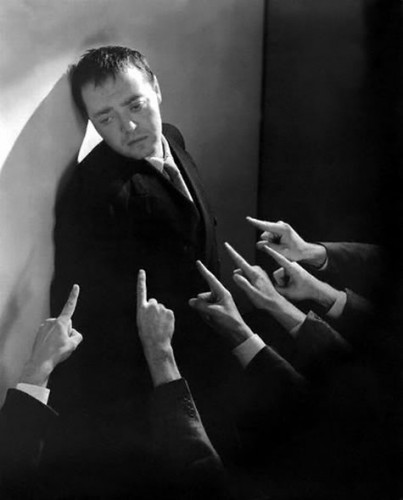
As Father’s Day rolls around, so does our Forgiveness Issue (purely coincidental). Here’s a teaser to the Fifth Issue of The Mockingbird–the Opener as well as the Table of Contents. Subscriptions and orders can be placed here.
A Cop Out in the Woods
 It turns out writing about forgiveness is hard. Maybe we don’t experience it very much, maybe we haven’t had the words to describe it when we have experienced it, but it certainly seems easiest to picture forgiveness by what it isn’t. And there are plenty of examples. Whole genres of film, drama and music have dealt with narratives of revenge and grudge holding. I think immediately of cowboy tropes—of Wyatt Earp and the OK Corral, or the Hatfields and McCoys in Kentucky. There are also the epic revenge novels, like Dumas’ The Count of Monte Cristo, where the victim of injustice wins back his vindication. In all these stories some boundary is crossed, and the plot revolves around that boundary being restored again.
It turns out writing about forgiveness is hard. Maybe we don’t experience it very much, maybe we haven’t had the words to describe it when we have experienced it, but it certainly seems easiest to picture forgiveness by what it isn’t. And there are plenty of examples. Whole genres of film, drama and music have dealt with narratives of revenge and grudge holding. I think immediately of cowboy tropes—of Wyatt Earp and the OK Corral, or the Hatfields and McCoys in Kentucky. There are also the epic revenge novels, like Dumas’ The Count of Monte Cristo, where the victim of injustice wins back his vindication. In all these stories some boundary is crossed, and the plot revolves around that boundary being restored again.
Or there are the non-forgiveness stories like Breaking Bad and Crime and Punishment, where there is no such thing as ‘getting away with it.’ I heard a real-life version of this recently. On the radio show Snap Judgment, Robert Davis, an ex-police officer in New Orleans, tells his story. A crooked cop in the late 1970s, he lists several occasions where he bartered with people to get out of their arrests. When an internal affairs charge was made against him, he was warned that there would be a sting operation, so he ran. Knowing that he could be tracked down in another city, and that any phone calls to his family would be bugged, he became a fugitive living in the woods.
I distinctly remember looking at the stars and seeing a plane flying south and thinking about siblings I had left behind. I had also just had a son that had been born at that time… Eventually I got better and more comfortable being out there. After about a year of being out in the woods, I wasn’t scared anymore. And you have to remember, as the months and years are passing, I am leaving what I’m used to… I camped on every state in the mainland… After five years I was heartless. After ten years I was a true animal, in the true sense of the word. No feelings at all. After fifteen years, being a fugitive felt normal.
[soundcloud url=”https://api.soundcloud.com/tracks/204099580″ params=”color=2fa1c7&show_artwork=false” width=”100%” height=”166″ iframe=”true” /]
An extreme example, no doubt, but “being a fugitive” feels normal for all of us, whether we crawl into the woods or not. We run from the cops in our lives—from a person who disapproves of us, from a ‘tough conversation’ that needs to be had, from a bridge we burned years ago. And there are people in life for whom we are those cops, where we represent something that must be evaded or obscured. Spiritually speaking, these habits of hiding become so sticky and pervasive in our lives that we begin to lose sight of who we are. The same thing happened to Robert Davis.
As in Crime and Punishment, he had lived “free” in the woods, but he wasn’t free. He had become his own incarceration. His evasion of punishment had not stemmed the punishment, it had only turned him inward, devouring what humanity he had, until he could no longer recognize the monster that remained. He became so terrified at this revelation that he went back to New Orleans and gave himself up.
No matter how you slice it, a life without forgiveness is a life of imprisonment. St. Paul says that even while we run from the Law, running into the woods of all our self-justifications and survival skills, even there our conscience will convict us; the Law, as it were, is “written on the heart.” And this inconsistency—the hideouts that go undetected and the criminal that sleeps there—is enough to split a person in two. We turn inward, away from help and, paradoxically, away from ourselves.
Jesus seemed to believe that everyone was like this, burying themselves in some thicket to hide from their guilt. This is why he correlates love with forgiveness, saying that, in order to love people at all, forgiveness must be the ground on which love stands. Forgiveness calls the criminal from his hideout and makes him a human being again.
This didn’t seem possible for Robert Davis. After all, there is no forgiveness in the justice system. And yet, entering his old police department, the strangest thing happened:
They run me through the computers, and they can’t find me. They say, “You’re not wanted, sir.” (Keep in mind, it’s been twenty-two years.) The District Attorney himself says, “You are free to walk out of here, because you are not wanted.” I had an instant choice to make: I could have walked out, or I could have told him how to prove that I am guilty.
Exhausted by the years of hiding, he chose to uncover his own guilt. Robert was brought into custody and given a trial. He admitted not only to the crimes that were charged to him, but added ones that had not been discovered. The judge, in hearing his honest appraisal, told him the years he would need to serve, but then, in a miraculous move of mercy, granted him a suspension of his sentence. Robert Davis was free:
You’re telling me, that after all this, I’m free? I definitely deserve much worse.
While this kind of forgiveness on earth is always a miracle, it is precisely the kind of forgiveness we need. In a lifetime of trying to fly “under the radar,” what a relief to know that the radar had been turned off! It is offered to us by Jesus. As 1 John says, “If our hearts condemn us, God is greater than our hearts, and he knows everything.” In God there is the power to dredge up all that makes us hide, and there is also the power to wipe it all away. God’s forgiveness is the absolving kind—there is no residue left, no post-bond payment plan. What is given is everything that’s needed. A fresh start and a clean slate.
In this issue of The Mockingbird, we’re looking long and hard into this well of forgiveness—into where it finds its toughest opponents, when it works and when it doesn’t, and how it shows up in our closest human relationships. We have interviews with the bestselling author Philip Yancey and the Norwegian warden of the “Nicest Prison in the World,” Arne Nilsen. We have the pleasure to republish a short story by the legendary O. Henry, more than 100 years after its original publishing. And we have essays that cover the gamut—essays on the risk of forgiveness, on marital forgiveness, on the idea of self-forgiveness, on forgiveness in the midst of culture wars.
It’s a lot to digest, so we hope you’ll take it slow. We’ll forgive you if you don’t, though.
Ethan Richardson, Editor
Contents
Opener: A Cop Out in the Woods
A Losing Economy: Getting Real About the Risk of Forgiveness by Ethan Richardson
Confessional
 Grace in an Age of Fear: A Conversation with Philip Yancey
Grace in an Age of Fear: A Conversation with Philip Yancey
For the Record: 13 Non-Don Henley Forgiveness Songs by David Zahl
Hearts and Crosses by O. Henry
Hearts, Crosses, and the Character of Forgiveness by Will McDavid
For the Record: Broadway Musicals, The Unforgiving Reformation, Bookshelf
Forgiveness Through Deep Breathing (Or What Mr. Miyagi Taught Me About My Inner Life) by Aaron Zimmerman
Human Inside: Meet the Warden of the World’s Nicest Prison
Everything from Zero: Voices from the Tunisian Revolution by CJ Green
For the Record: The Best Anti-Commencement Speeches by Matt Schneider
A Forgiveness Observed: Grace, Memory, and The Disappearance of Eleanor Rigby by Michael Leary
Blood on the (Dance) Floor: A Sermon by David Zahl
[soundcloud url=”https://api.soundcloud.com/tracks/177843551″ params=”color=ff5500″ width=”100%” height=”166″ iframe=”true” /]

COMMENTS
5 responses to “Inside The Forgiveness Issue (Opener and Table of Contents)”
Leave a Reply















Just leafed through the proof and cannot believe how well it turned out. So excited about this issue. Bravo, Ethan!
#whoisarnenilson?
Agreed. Wonderful
Can’t wait to see it at my door step.
This was an amazing issue. That poem and the O. Henry story were so affecting. Thank you.